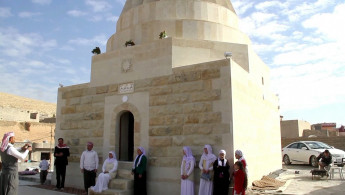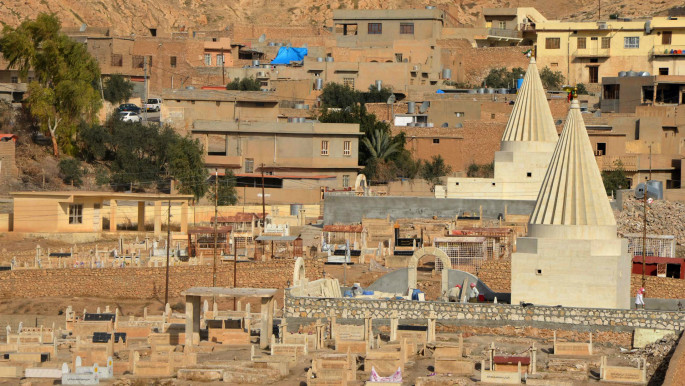Iraqi Yazidis celebrate restoration of temple destroyed by IS
Northern Iraq's Yazidi community that suffered horrific atrocities under Islamic State group persecution celebrated on Friday as it inaugurated a restored temple to the sound of traditional drums and flutes.
Overlooked by conical domes of polished stone, hundreds of men in dishdasha robes and women veiled in white gathered at the site which was blown up by the rampaging jihadists in 2014.
The temple at Bashiqa was one of 68 Yazidi temples destroyed by IS, officials said - and one of the last of 23 in the region to be restored.
Iraq's Kurdish-speaking Yazidis adhere to a faith that emerged in Mesopotamia more than 4,000 years ago.
It is rooted in Zoroastrianism but has over time integrated elements of both Islam and Christianity.
Yazidis pray to God facing the sun and worship his seven angels - the most important of which is Melek Taus, or Peacock Angel.
The Yazidi community in Iraq comprised some 550,000 people before it was scattered by the IS offensive.
Orthodox Muslims consider the peacock to be a demon figure and refer to Yazidis as devil-worshippers.
The jihadists murdered Yazidis in their thousands in 2014 and abducted thousands of women and teenage girls to make them sex slaves.
According to the religious affairs ministry in Iraqi Kurdistan, some 360,000 Yazidis were displaced by the fighting with 100,000 leaving the country.
Of 6,417 Yazidis reported kidnapped by the jihadists, just 3,207 have been rescued or managed to escape their captors. Half of those still missing are women and girls, the ministry said.
It also said that to date 47 mass graves of Yazidis massacred by IS have been discovered.
UN investigators have said the IS assault on the Yazidis was a premeditated effort to exterminate an entire community - crimes that amount to genocide.
 |
This ceremony shows that life has returned despite the terrorism of IS and its bloody attacks |  |
Friday's ceremony at the temple in the Bashiqa area some 15 kilometres (nine miles) east of Iraq's second city Mosul was an act of both revival and defiance.
"This ceremony shows that life has returned despite the terrorism of IS and its bloody attacks," said 21-year-old Jihan Sinan.
Around her, families posed for pictures as traditional dishes and sweets were handed out and celebrants danced to the tunes of traditional flutes.
Religious leader Ali Rashwakari, 72, urged the international community to help "rebuild the temples and Yazidi regions" of Iraq.






 Follow the Middle East's top stories in English at The New Arab on Google News
Follow the Middle East's top stories in English at The New Arab on Google News


